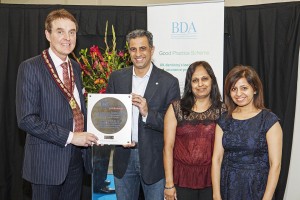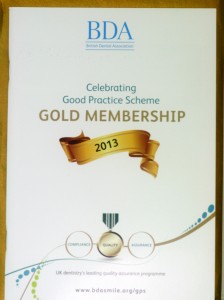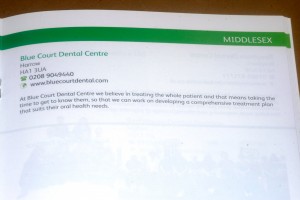Dr Nishan Dixit is the founder and principal dentist of Blue Court Dental. Patients enjoy his relaxed, friendly and gentle approach while experiencing his meticulous attention to detail. He has a special interest in providing smile makeovers, natural-looking white fillings and cosmetic braces, but also provides a range of treatments from preventative and general dental care to complex dental rehabilitation.
Latest posts by Dr Nishan Dixit (see all)
With more and more people looking for cosmetic dentistry, particularly teeth whitening in the Harrow area we thought we would write an article which outlines some of the problems faced by the general public when looking to have whiter teeth.
Driving down the cost of teeth whitening
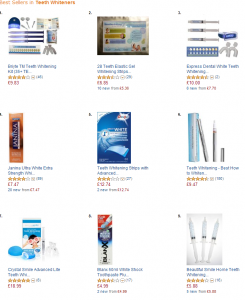 Teeth whitening is often viewed as a quick fix and many people are looking for the cheapest option. This has driven many patients to the idea of whitening their teeth at home – just doing a search for teeth whiteners on Amazon brings up a whole host of options including home whitening kits, elastic gel whitening strips, advanced teeth whitening programs, toothpastes, laser lights and whitening pens.
Teeth whitening is often viewed as a quick fix and many people are looking for the cheapest option. This has driven many patients to the idea of whitening their teeth at home – just doing a search for teeth whiteners on Amazon brings up a whole host of options including home whitening kits, elastic gel whitening strips, advanced teeth whitening programs, toothpastes, laser lights and whitening pens.
Amazingly some of these products start from as low as 30p for the plasma whitening light and £3.17 for the whitening pens so it is easy to understand why the temptation is there. Here’s more detailed information on that search on Amazon.
Also reported in the Harrow Times a couple of years ago was a trading standards report which carried out tests on some DIY whitening products and found some of them contained 7.3% hydrogen peroxide which is way over 0.1% legal limit.
We’re aren’t suggesting that any of these products shown here contain these unacceptable levels of hydrogen peroxide, but it’s worth noting that when you purchase things on the Internet you don’t always know exactly what you’re getting as everything is unregulated.
Going to a Beauty Salon for Teeth Whitening
Whilst whitening clearly falls within the realms of helping one’s self look and feel better it is worth noting that the General Dental Council (GDC) say:
“We believe that teeth whitening is part of the practice of dentistry and dentistry must only been carried out by the professionals that are registered with us…”
This means that if you have your teeth whitened by anyone other than a dental professional it could be considered illegal and prosecution could follow. The process of whitening teeth uses hydrogen peroxide to bleach them, whilst this is in a very low concentration it needs to be carefully controlled around your delicate gum area. The way this is controlled is by manufacturing a highly customised and bespoke ‘tray’ which fits over your own teeth, this tray is designed in such a way to prevent leaking of the bleaching gel into the gum area.
The manufacture of these trays is something which needs to be undertaken by professional that knows exactly how to design them to prevent damage to your delicate gum.
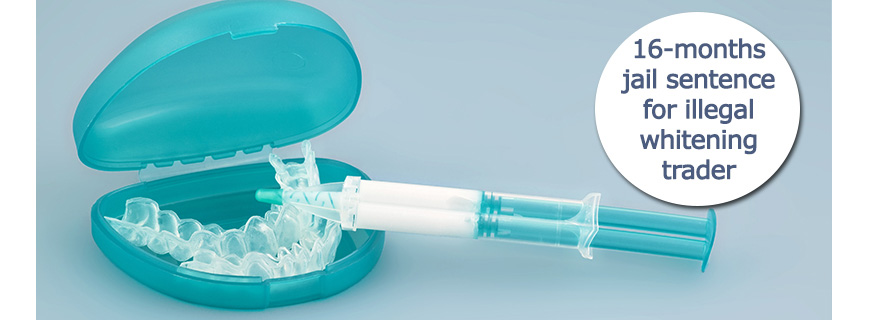 Teeth whitening is also not suitable for everyone, you need to have good oral hygiene and be free of certain dental diseases. Only a trained dental professional will be able to tell if your oral health care routine is good enough to have whitening, we have even seen cases where patients have had teeth whitening by non-dental professionals and that patient’s teeth was covered in plaque. The results of this was that it wasn’t the teeth which were whitened, but the plaque, and this will pick up staying again very quickly.
Teeth whitening is also not suitable for everyone, you need to have good oral hygiene and be free of certain dental diseases. Only a trained dental professional will be able to tell if your oral health care routine is good enough to have whitening, we have even seen cases where patients have had teeth whitening by non-dental professionals and that patient’s teeth was covered in plaque. The results of this was that it wasn’t the teeth which were whitened, but the plaque, and this will pick up staying again very quickly.
A dental professional would recognise this problem early on and recommend a course of oral hygiene education/treatment before the teeth whitening is carried out.
In rare circumstances we have also seen teeth whitening performed by non-dental professionals to cause burning of the gums. This can happen if the customised whitening tray does not fit well enough, once again it takes a fully trained dental professional to recognise this problem at an early stage.
The problem of non-dental professionals undertaking teeth whitening has become so great that a new organisation has come into formation.

The teeth whitening information group (TWIG) is a group of dental professionals and manufacturers who are concerned about the problem of harmful, illegal products and unqualified people carrying out teeth whitening. They offer a useful information leaflet and a facility to report any illegal teeth whitening happening around Harrow area and beyond.
If you notice any non-dental professional offering teeth whitening please do contact TWIG
So, what do you do if you want safe teeth whitening?
The only way to know for sure that you will be safe during teeth whitening is to visit a dentist. This dental professional will have a detailed understanding of your oral health and be able to advise if teeth whitening is suitable for you. Unfortunately it’s not always that simple this article in the mail online talks about how one patient spent £600 on teeth whitening and saw no result at all, and that was with a dentist. Results can vary and can never be 100% guaranteed so we recommend asking any dentist that you go to see for before and after photographs of happy patients.
You also need to feel that you can trust your dentist, so ask them about the risks, discuss with them the possibility that the whitening may not work and what would happen then. Being open and honest with your dentist before any treatment is the best way to ensure that you get the excellent teeth whitening result that you will be looking for.
Summary
Having said all of that teeth whitening remains one of the easiest ways to look and feel more confident with your smile. It is generally available to anyone with a healthy dentition and with all of their own teeth (if you have crowns, veneers or white fillings then these will not whiten so you will need to discuss with your dentist the possibility of having them replaced after your natural teeth have been bleached).
When carried out by dental professional it is also one of the most predictable and safe techniques available in modern dentistry, you will find that many dentists have had their own teeth whitening in their own practice, and that says a lot in itself about how good the procedure can be when carried out by a dental professional…
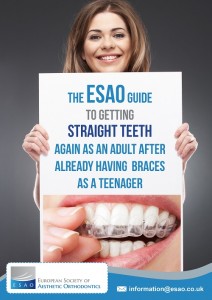 One of the most common reasons for patients visiting the dentist for teeth straightening is relapse after having orthodontics when they were younger. Patients often find that once they stop wearing their retainers that their teeth can begin to move back to where they were before. Coupled with the fact that as we get older our teeth have a tendency to drift forwards and become more overcrowded.
One of the most common reasons for patients visiting the dentist for teeth straightening is relapse after having orthodontics when they were younger. Patients often find that once they stop wearing their retainers that their teeth can begin to move back to where they were before. Coupled with the fact that as we get older our teeth have a tendency to drift forwards and become more overcrowded. As the name suggests Six Month Smiles offers orthodontics which take, on average, six months to achieve the new look. The system is fixed using tooth coloured wires and brackets to ensure that no one else knows that you have braces fitted. As with most of these aesthetic orthodontic options Six Month Smiles is only used to straighten the front six teeth, often known as the social six.
As the name suggests Six Month Smiles offers orthodontics which take, on average, six months to achieve the new look. The system is fixed using tooth coloured wires and brackets to ensure that no one else knows that you have braces fitted. As with most of these aesthetic orthodontic options Six Month Smiles is only used to straighten the front six teeth, often known as the social six.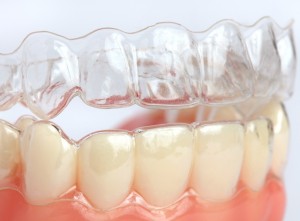 Clear Aligners are exactly that, completely clear. They work by moving your teeth a small amount at a time. You will be provided with a series of aligners which you will typically wear for about two weeks each. Each aligner puts a small amount of pressure on your teeth to move them or rotate them to their new position. Once your teeth have moved a tiny amount you will replace the aligner with the next one in the series.
Clear Aligners are exactly that, completely clear. They work by moving your teeth a small amount at a time. You will be provided with a series of aligners which you will typically wear for about two weeks each. Each aligner puts a small amount of pressure on your teeth to move them or rotate them to their new position. Once your teeth have moved a tiny amount you will replace the aligner with the next one in the series.


 Teeth whitening is often viewed as a quick fix and many people are looking for the cheapest option. This has driven many patients to the idea of whitening their teeth at home – just doing a search for teeth whiteners on Amazon brings up a whole host of options including home whitening kits, elastic gel whitening strips, advanced teeth whitening programs, toothpastes, laser lights and whitening pens.
Teeth whitening is often viewed as a quick fix and many people are looking for the cheapest option. This has driven many patients to the idea of whitening their teeth at home – just doing a search for teeth whiteners on Amazon brings up a whole host of options including home whitening kits, elastic gel whitening strips, advanced teeth whitening programs, toothpastes, laser lights and whitening pens. Teeth whitening is also not suitable for everyone, you need to have good oral hygiene and be free of certain dental diseases. Only a trained dental professional will be able to tell if your oral health care routine is good enough to have whitening, we have even seen cases where patients have had teeth whitening by non-dental professionals and that patient’s teeth was covered in plaque. The results of this was that it wasn’t the teeth which were whitened, but the plaque, and this will pick up staying again very quickly.
Teeth whitening is also not suitable for everyone, you need to have good oral hygiene and be free of certain dental diseases. Only a trained dental professional will be able to tell if your oral health care routine is good enough to have whitening, we have even seen cases where patients have had teeth whitening by non-dental professionals and that patient’s teeth was covered in plaque. The results of this was that it wasn’t the teeth which were whitened, but the plaque, and this will pick up staying again very quickly.
 Poor oral hygiene can affect your whole body, from your heart to your lungs to even your genitals! Take a look at the diagram above and then read on to find out what the likely results of poor hygiene are on your body. Perhaps you should think now about
Poor oral hygiene can affect your whole body, from your heart to your lungs to even your genitals! Take a look at the diagram above and then read on to find out what the likely results of poor hygiene are on your body. Perhaps you should think now about 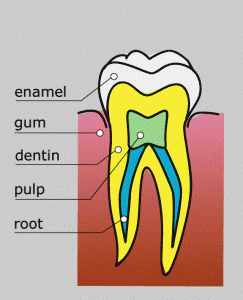 Gum disease, which includes periodontal disease, is inflammation and infection that destroys the tissues that support the teeth, including the gums, the periodontal ligaments and the tooth sockets (alveolar bone). Gum disease affects more than half of the adult population with natural teeth. It can be treated by a dentist or hygienist and in the early stages the effects can be reversed. There are two main types of gum disease:
Gum disease, which includes periodontal disease, is inflammation and infection that destroys the tissues that support the teeth, including the gums, the periodontal ligaments and the tooth sockets (alveolar bone). Gum disease affects more than half of the adult population with natural teeth. It can be treated by a dentist or hygienist and in the early stages the effects can be reversed. There are two main types of gum disease: